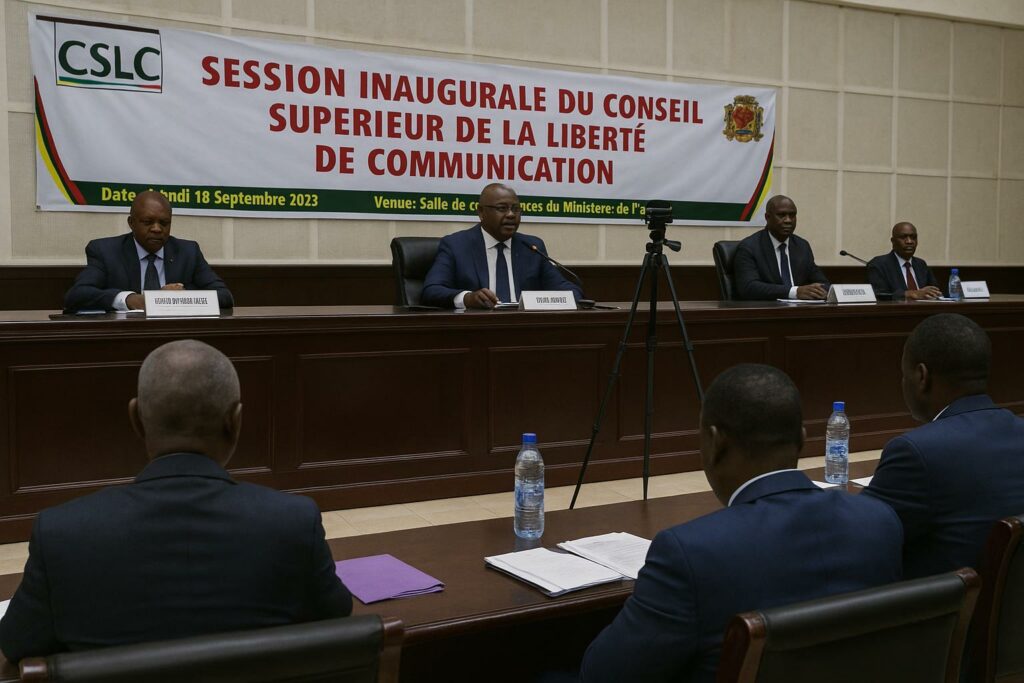Modernising the CSLC rulebook
The quiet auditorium of the Conseil supérieur de la liberté de communication filled on 8 September with a sense of institutional renewal. Its president, Médard Milandou, declared that the inaugural session “opens a chantier of reflection”, a construction site in the intellectual sense, designed to modernise the Council’s internal, financial and procedural texts. Citing article 55 of the current rules, he reminded members that the meeting follows the 19 August election of the vice-president and secretary accountant and is devoted exclusively to foundational documents. In practice, the body wants to ensure that its mechanisms for deliberation, budgetary control and sanctions reflect the realities of a media ecosystem that is morphing at unprecedented speed.
Digital upheaval and the AI challenge
The president’s tone mixed prudence with optimism as he spoke of the digital revolution sweeping through Central Africa. Streaming services, encrypted messaging applications and algorithm-driven newsfeeds have blurred the traditional boundaries between broadcaster and audience. “Regulation,” he observed, “has become a shared challenge for every member of the African and Francophone regulatory networks.” In periods of intense political competition, such as election seasons, the surge of deepfakes, micro-targeted advertising and live social-media broadcasting obliges the CSLC to refine both its legal definitions and its technical monitoring tools. Comparable agencies from Abidjan to Montréal, he noted, already exchange expertise, a dynamic the Brazzaville institution intends to reinforce through memoranda of cooperation signed earlier this year (official communiqué du CSLC, 2023).
Dialoguing with the newsroom
One concrete step will be a face-to-face workshop with editors-in-chief and digital content managers later this month. The session will revisit the national Code of Ethics and Deontology, a document that remains, in Milandou’s words, “the compass guiding every journalist, whether on FM waves or mobile screens”. The regulator will present scenario-based exercises illustrating how misinformation may circulate during a hypothetical campaign and how outlets can mitigate its impact by transparent sourcing and prompt corrections. Industry representatives have welcomed the initiative. According to Emilienne Ognimba, director of a private television channel, “The conversation arrives just in time; our reporters navigate a flood of user-generated content and need legal clarity.” Her view echoes comments from the Union des professionnels de la presse du Congo, which has called for stronger self-regulation paired with predictable oversight (UPPC statement, 2023).
Key Takeaways
The two-day inaugural session operates under the amended Organic Law 27-2022, aligning the CSLC’s mandate with technological evolution. Members will debate a draft budgetary charter aimed at tightening procurement procedures and enhancing transparency of fines levied on outlets. They will also examine a new classification for online video services, proposing a tiered system calibrated to audience reach and potential societal impact. While the timetable is tight, the leadership expects to transmit final proposals to the National Assembly before year-end, opening the door to smoother relations with innovators in the audiovisual sector.
Legal and Economic Lens
From a juridical standpoint, the reforms seek to reconcile two imperatives firmly embedded in the Congolese Constitution: the freedom to inform and the responsibility to avoid defamation and hate speech. Constitutional scholars at Marien-Ngouabi University observe that the updated bylaws may become a regional reference if they succeed in fusing conventional safeguards with algorithmic accountability. Economically, clearer rules could stimulate investment. Domestic start-ups developing streaming platforms have so far faced uncertainty over licensing fees. A predictable fee grid, coupled with a streamlined authorisation process, is expected to lower entry barriers and encourage local content production, contributing to the diversification objectives of the National Development Plan 2022-2026.
Looking ahead to the next ballot
Although the presidential election lies on the horizon, the CSLC is already calibrating its posture. The regulator plans to deploy an expanded monitoring unit equipped with speech-to-text software capable of analysing real-time broadcasts and social-media livestreams. Training sessions for analysts, financed under a partnership with the Agence de régulation des télécommunications, are scheduled for early 2024. Such anticipation underlines the Council’s conviction that credible, peaceful elections rest on balanced media coverage. Milandou closed the opening session by reaffirming that stance, emphasising that the institution “remains a pillar of national cohesion, promoting debate that is both free and respectful.” His words were met with sustained applause, suggesting a shared commitment to navigate the digital era without relinquishing the foundational values of the Republic of the Congo.

